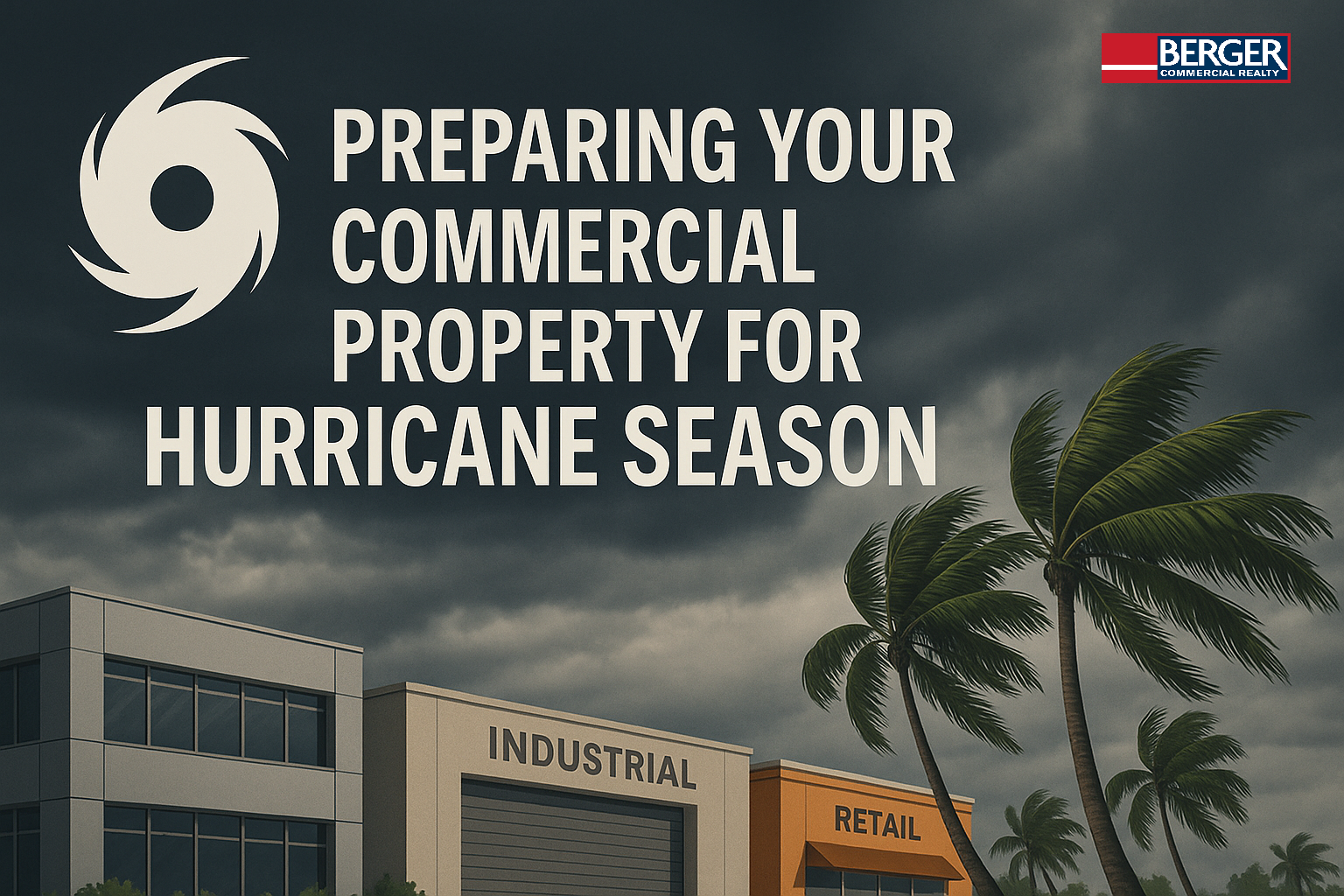
Preparing Your Commercial Property for Hurricane Season
Berger Commercial Realty / May 8, 2025
Hurricane season in South Florida is not just a time for heightened weather awareness—it’s a crucial period for ensuring the safety and security of your commercial property. Whether you own or manage office spaces, industrial facilities, or retail properties, taking the right steps ahead of time can make all the difference. Here’s how each property type should prepare, along with steps to take if a storm is predicted to hit and final precautions right before landfall.
Office Properties
- Window Protection: Install storm shutters or impact-resistant glass to prevent breakage. Consider using shatterproof window film for added security.
- Secure Loose Items: Remove or secure outdoor furniture, signage, and decorations that could become projectiles. Even small items like planters or outdoor art should be moved indoors.
- Data Backup and IT Protection: Ensure all servers and IT equipment are protected with surge protectors and backed up off-site. For extra precaution, use waterproof server racks and elevate equipment to prevent water damage.
- Elevator Safety: Lock elevators in place on the highest floor to prevent flooding damage. Additionally, install water sensors in elevator shafts to detect rising water early.
- Emergency Supplies: Stockpile essentials like water, non-perishable food, and medical kits in case of power outages. Include items like solar-powered chargers, hand-crank radios, and LED lanterns.
- Parking Garage Protection: If your office property includes parking garages, consider installing flood barriers and ensuring drainage systems are clear.
- Roof Drains and Scuppers: Clear all roof drains and scuppers to prevent water pooling that could lead to leaks or roof collapse.
Industrial Properties
- Roof Inspections: Inspect roofing for loose panels or signs of wear. Reinforce where necessary. Consider adding secondary water barriers beneath roof surfaces.
- Warehouse Doors: Secure and brace large rolling doors to prevent wind damage. Adding wind locks or vertical reinforcement bars can add extra protection.
- Outdoor Equipment: Move outdoor equipment indoors if possible, or anchor it securely. Use specialized hurricane straps for heavy machinery and portable buildings.
- Inventory Protection: Elevate inventory off the floor and use waterproof coverings to minimize flood damage. Consider using pallet racks with flood barriers at the base.
- Power Generators: Test backup power systems to ensure functionality during outages. For critical operations, have a secondary backup generator on standby.
- Drainage and Sump Pumps: Inspect all drainage paths and ensure sump pumps are operational. Install battery backups for sump pumps in case of power failure.
- Exterior Lighting and Security Cameras: Reinforce exterior lighting poles and camera mounts. Check that all cameras are secured and waterproofed.
Retail Properties
- Board Up Windows: Install storm shutters or board up windows with plywood. Consider clear polycarbonate panels that allow visibility while providing impact resistance.
- Inventory Management: Move high-value inventory away from windows and consider storing it off-site. Secure shelving units to prevent tipping during strong winds.
- Signage and Awnings: Remove or securely fasten signage, awnings, and any hanging displays. Use heavy-duty bolts or quick-release mounts for easy removal.
- Utility Shutoffs: Know how to shut off water, gas, and electricity if instructed by local authorities. Clearly label all shutoff valves for quick access.
- POS System Backup: Ensure all Point-of-Sale systems are backed up to the cloud and are able to operate on mobile networks if power is lost.
- Window Decals and Branding: Remove or secure window decals that could become airborne hazards during high winds.
What to Do If a Storm Is Predicted
- Communicate with Tenants and Staff: Ensure all tenants and staff are informed about the emergency plan.
- Secure Documents: Protect important documents and lease agreements in watertight containers. For extra protection, consider off-site storage or secure cloud-based backups.
- Activate Emergency Protocols: Implement pre-established emergency procedures, including backup power activation and securing entry points.
- Test Security Systems: Ensure all security cameras, alarms, and communication systems are operational.
- Disconnect Electronics: Unplug non-essential electronics to prevent surge damage. Elevate them off the ground to avoid water damage.
Last-Minute Preparations
- Reinforce Entry Points: Double-check all doors and windows are secure. Apply additional sealant to any areas prone to leaking.
- Evacuate Non-Essential Personnel: Follow evacuation orders if necessary. Have a checklist for securing office spaces quickly.
- Final Walkthrough: Conduct a final walkthrough to ensure nothing is left unsecured. Look for hidden risks like unsecured rooftop vents or exposed HVAC units.
📞 Need Expert Help Preparing Your Property this Hurricane Season?
Berger Commercial Realty/CORFAC International specializes in property management and hurricane season preparedness for office, industrial, and retail spaces. Our team can help you safeguard your investment with proactive planning and emergency response strategies. Contact us today to learn more about how we can support your property during hurricane season.« Previous Next »
